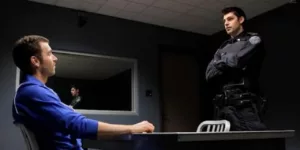When a person is arrested, they are read their Miranda rights. This right explains to the arrested individual that whatever they say can and will be used against them in the court of law. Since this is based on the 5th amendment of the constitution that states that a person cannot be forced to give a testimony that can incriminate them or their spouse, the option to remain silent is treated as a citizen’s right. You can get a full description of this amendment in this article.
Given the above, anyone who is arrested should as a matter of survival watch what they say. How easy is this? Not very easy you will agree especially when emotions are running high and the individual is confused. The best advice is therefore not to say anything until your lawyer gets to you.
Let’s quickly look at some reasons why you should only speak with law enforcement agents with your lawyer present.
Don’t Talk to the Police without a Lawyer for these Reasons:
The Police Can Wait
It’s not a race or a matter of life and death so the Police can wait for your lawyer to get to you. The fact that they are even trying to convince you to talk without your lawyer should set off some warning bells. The more the pressure to talk without an attorney, the more you should resist because the Police know that the law requires your attorney to be present unless you waive that right, which of course you shouldn’t.
The Police Want to Build their Case, Not Free You
In the eye of the law, you are regarded as “innocent until proven guilty”. Sadly, some law enforcement agents are more interested in proving their case than proving your innocence. This means that they will be actively looking for any evidence to support their theories and not those that show your innocence. With this in mind, distrust any offer or promises they make you without an attorney present. Any promise or deal should be made with and through your attorney.
They are on the Clock
In the constitution, every citizen is guaranteed the right to a speedy arraignment and trial. To this end, most states demand that the state (Police) either charge an accused within 72 hours or they have to be released.
What this means is that the Police are literally on the clock. They must prove their case and make it ready for trial within 72 hours of holding you. Though in some cases the Police can request to be granted permission to hold an individual for longer, there has to be some serious evidence for this to be granted.
Therefore, you can be out on bail before you know it if you just keep quiet and wait for your attorney. Even if you can’t make whatever bail amount is set by the court, you can get help with that here.
Your Testimony Can Implicate You
Remember that Miranda rights? Well, you will do well to remember it because what you say can really implicate you. A lot of times, the police are just “fishing”. That is, they have no concrete evidence so they just “shake the tree” to see what will fall out.
Do not be the one to inadvertently give them the evidence they need to send you to jail. The Police can trip you up with trick questions that can get you to confuse yourself and in the process say things they can hold unto and charge you with.
It’s pretty simple; JUST SHUT UP TILL YOUR LAWYER GETS THERE.
You can find a few other reasons not to talk to the Police without your attorney present here:
Frequently Asked Questions
Let’s conclude by answering some frequently asked questions.
Can the Police Force me to Speak?
No they can’t. Even the courts can’t since you can plead the fifth. The Police will only want to trick you, scare you and intimidate you into talking. If you insist on not talking without having your lawyer around, they will have no choice but to leave you be. This right may however be waived if you are accused of offences that are classified as a threat to national security.
Can I talk to them without a Lawyer if I am Innocent?
The fact that you are not guilty can change very quickly when you start talking. Whether innocent or guilty, your best bet is to wait for your attorney before talking to the Police.
Written by:
Spencer Calvert








